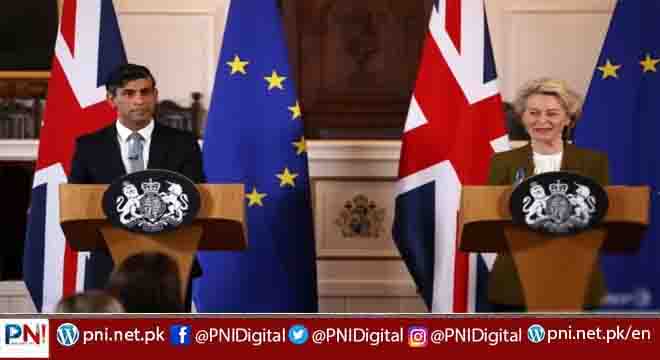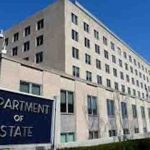London, Feb 27 (AFP/APP): Britain and the European Union proclaimed a “new chapter” in relations on Monday as they agreed a crucial overhaul of trade rules in Northern Ireland that aims to ease tensions stoked by Brexit.
Prime Minister Rishi Sunak and European Commission president Ursula von der Leyen adopted the deal at a meeting in Windsor, west of London.
The landmark deal follows more than a year of tense talks over the “Northern Ireland Protocol”, which has unsettled the province 25 years on from a historic peace deal that ended three decades of armed conflict.
Agreed in 2020 as part of Britain’s EU divorce, the pact kept the province in the European single market for physical goods and subject to different customs rules than the rest of the UK, angering pro-UK unionists there and eurosceptics in London.
The UK government had threatened a unilateral overhaul of the protocol unless the EU agreed to wholesale changes, souring diplomatic ties and risking a wider trade war.
“This is the beginning of a new chapter in our relationship,” Sunak said at a press conference with von der Leyen, who also hailed a “new chapter”.
“I believe we have found ways to end the uncertainty… for the people of Northern Ireland,” Sunak added, touting several key issues the new deal — branded the “Windsor Framework” — would fix.
Von der Leyen heralded the “historic” agreement that would ensure a “stronger EU-UK relationship” to tackle shared challenges such as Russia’s war in Ukraine and climate change.
“The new Windsor Framework is here to benefit people in Northern Ireland, and support all communities, celebrating peace on the island of Ireland,” she said.
– Power-sharing –
The agreement ends a lengthy chapter of talks between London and Brussels, under the direction of three different British prime ministers and the cloud of the Ukraine war.
It is seen as long overdue to help stabilise both Northern Ireland and the wider relationship between post-Brexit UK and its European partners.
The protocol has faced staunch opposition from the Democratic Unionist Party (DUP), the largest pro-UK party in Northern Ireland, which argues that it threatens the province’s place within the UK.
The new framework creates a “green” check-free lane for goods coming from the rest of the UK that are intended to stay in Northern Ireland, without heading into Ireland and the EU’s single market.
UK-approved medicines will be fully available in Northern Ireland while the deal will also limit, but not scrap, oversight of the protocol by the EU’s European Court of Justice.
In a bid to address a so-called democratic deficit within the protocol, Northern Ireland’s devolved Stormont assembly will be allowed to prevent the application of new EU laws, subject to a veto from London.
– MPs’ vote –
Von der Leyen headed next to a meeting with King Charles III in Windsor, stoking accusations in the UK that Sunak was trying to project a royal endorsement of the deal.
Sunak’s spokesman insisted that the monarch’s meeting with von der Leyen was decided by Buckingham Palace.
The deal is likely to face opposition from Brexiteers, including Sunak’s predecessor Boris Johnson, and from lawmakers representing the pro-British unionist community in Northern Ireland.
The DUP has been particularly angered by the prospect of EU law retaining a role in Northern Ireland, and its response in turn could determine the reaction of Conservative eurosceptics in London.
DUP leader Jeffrey Donaldson, who has been refusing to re-enter a power-sharing government in Belfast set to be led by pro-Irish nationalists, tweeted that the party would “take our time to consider the detail”.
Sunak said that MPs would vote on the deal in the House of Commons “at the appropriate time”.
“I think it’s important we give everyone the time and the space they need to consider the detail of the framework,” he added.
– ‘About time’ –
The UK, which is grappling with low economic growth and its worst cost-of-living crisis in a generation, is seen as eager to reset relations to boost trade.
The government in London is also under pressure to restore power-sharing in Belfast, with the 25th anniversary of the 1998 Good Friday Agreement looming large.
Northern Ireland has been without a devolved government since February last year due to the DUP’s boycott.
In the Northern Irish border city of Newry, some residents were eager for a breakthrough and the restoration of power-sharing.
“We need things to get going again, we need to get this sorted out,” Vincent Ward, 53, told AFP.
Joe O’Hanlon, 63, added it was “about time” that elected leaders “got their act together”.
Follow the PNI Facebook page for the latest news and updates.









